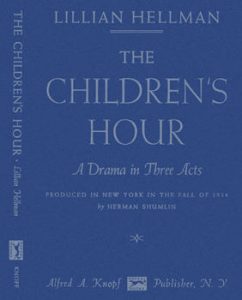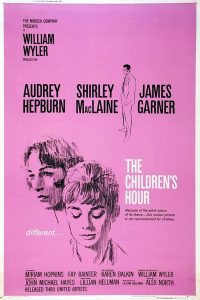Building Taboos:
The Children’s Hour (1934) and Social Discrimination
by Elif Yaren Candan

Being ahead of its time, The Children’s Hour (written by Lillian Hellman is dealing with the social discrimination that women were being subjected to in the 1930s and is still being subjected to in our days. The heroines of the drama, Martha and Karen are two young women and best friends for life. Being studied together, their ideal was to found a boarding school for girls and educate them properly for them to be well-educated and well-mannered people when they grow up. Fortunately, they found the school successfully and become teachers in the institution. Martha and Karen are very fond of the education of the girls. As being the responsible people for these girls’ education both in academic and social terms, they dedicate themselves to this sole purpose. Studying and receiving education has never been easy for women, who have experienced a lot of hardships in accessing the education or getting the right. Thus, it is essential that the peace in the school must be preserved by the teachers in the first place and then by the students. Never letting any kind of discrimination taking place among the students and in between the students themselves, both Martha and Karen maintain the peace. However, there is one student who disturbs it: This girl named Mary causes problems among her friends. Naturally, children tend to be naughty and lazy but with the right education, they are taught to channel their energy into something useful and purposeful. Unfortunately for Mary’s case, no matter how hard Martha and Karen tries to educate her, Mary ends up harming her friends and most importantly, the lives of her teachers’. The era that these teachers live in is not tolerant to the LGBTI+ community and sees it as taboo. Therefore, Mary’s mischievous plan of going home destroys Martha and Karen’s ideals and purpose in life since the plan affects them the most. Making up the story that these two women “love each other differently than women normally do”, Mary’s grandmother calls all the parents to inform them of this so-called absurdity she cannot even pronounce herself. All the endeavour of Martha and Karen and the hardships they have endured is wasted immediately due to their “abnormality”. Hearing their side of the story is never an option because what they did is unnatural of a woman in such a society; thus, they should not be the ones who educate all these girls; they should not be “teachers”. Punishing people for their personal lives, who they love, and who they want to become, do not bring out any kind of peace and morality in society. On the contrary, disrespecting the private life of a person is nothing but a violation that must be prevented. Especially for a woman who has to try harder in order to be successful and get what she deserves, this kind of injustice is not pleasant. In a world where equality must be for every single being on earth regardless of their race, gender, or anything personal; such discrimination in Lillian Hellman’s drama is nothing but a lesson that should be learnt and act against.

